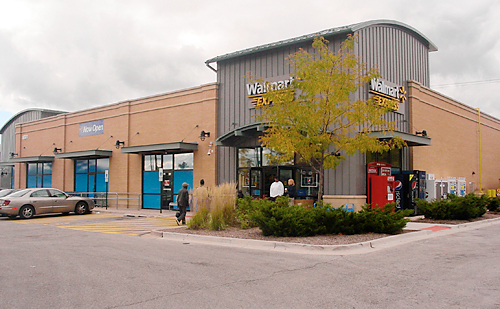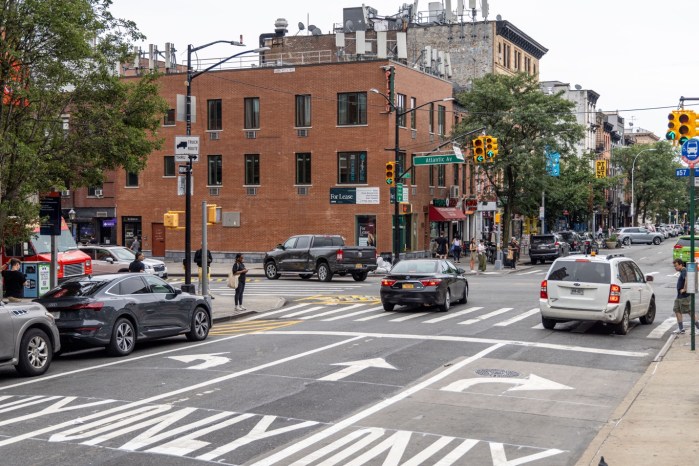CHICAGO — Last week, we told you a scaled-down Walmart grocery store could be coming to a block near you — so this week we visited one.
We sent a reporter to Chicago to check out two new supermarket-like “SmallMarts” to see exactly what Brooklyn may be getting as the controversial retailer pushes into the borough — and what we found wasn’t your-brother-who-lives-in-Jersey’s Walmart.
In fact, the scaled-down versions of the superstores offer all the conveniences of your local Key Food or Duane Reade, combined with an old-school Sears catalogue store for the Internet age.
Walmart has opened a 10,000-square-foot grocery store dubbed “Walmart Express” — one of only three nationwide — on the South Side of the Second City in a neighborhood similar to Canarsie, Flatlands or Sunset Park.
The boxy Express store is comparable in size to a large Walgreens or Rite Aid and is located in a strip mall off an expressway in a middle-class black neighborhood with ample street parking.
Most customers drive to the store and park in its adjacent lot that contains about 100 spaces, but there is a bus stop nearby for car-less shoppers. (In comparison, a proposed Whole Foods supermarket in Gowanus will have a parking lot that holds two to three times as many cars.)
Inside, the 11-aisle market sells staples such as milk ($2.08 per gallon), eggs ($1.22 per dozen), cut-up whole chicken ($0.98 per pound), ground beef ($3.78 per pound) and fresh fruits and vegetables.
But shoppers can also order more typical Walmart items like televisions, laptops, and even bedding, then have them shipped for free to the store for pickup.
“Futons and mattresses are really popular,” said manager Mark Sanders. “And this week, I had someone order seven rolls of carpet.”
The Express store isn’t Walmart’s only option for setting up shop in a densely populated urban area where space is limited.
Over the past decade, the company has launched 155 “Neighborhood Markets,” grocery stores about three times as large as the Express — including one that opened last week in Chicago’s bustling West Loop, a former industrial neighborhood comparable to DUMBO or the burgeoning waterfront in Williamsburg.

The store we visited had brightly lit aisles with polished produce, and lured in the neighborhood’s business crowd and commuters with inexpensive tuna sandwiches ($3.28), ham and cheese heroes ($4.98 for a foot-long sub) and prepared fruit salads ($4.25).
And like the Walmart Express, shoppers can order large items from Walmart’s website and have them delivered for free to the market.
Walmart executives say that the Chicago markets are a test, and that there are no current plans to put them outside of Chicago, Arkansas, and North Carolina. But such stores are similar to dozens of existing large grocers all over Brooklyn.
“At the end of the day, we want the store size and format to be a reflection of the neighborhood it is in,” said Walmart spokesman Steve Restivo.
Despite advance protests, the store hasn’t been a disaster for other area businesses.
Nine blocks from the Neighborhood Market is Mac Kelly’s Greens N’ Things, which mostly sells takeout salads and sandwiches. The manager has said that the eatery has not felt the so-called “Walmart effect.” But he’s still worried.
“I wouldn’t put anything past [Walmart], said Mac Kelly’s manager Mike, who did not give his last name. “I believe the little guys are going to disappear. You just do the best you can.”
Walmart hasn’t yet committed to opening in Brooklyn, but continues to eye the Gateway II shopping center off the Belt Parkway in East New York as a location for one of its standard big-box department stores.
That project is mired in labor-union–backed protests over the company’s allegedly low pay, so-called union-busting tactics, and supposed detriment to existing mom-and-pop stores.
At the same time, Walmart has lavished the borough with donations over the last two years, supporting the Brooklyn Public Library, the restoration of the nearby Gateway Salt Mash and Borough President Markowitz’s summer concert series.
There are no laws keeping Walmart out of Brooklyn, and the company can open a Superstore, Express, or Neighborhood Market in the borough, subject only to the same city zoning that covers any other store.
























